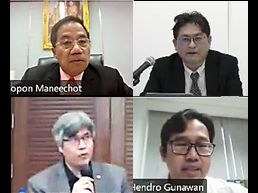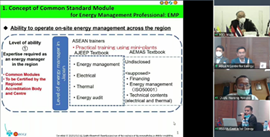
Holding of Post Meeting in the FY2022 energy conservation support project for ASEAN countries
<Meeting>
Under the instruction and financial support of the Ministry of Economy, Trade and Industry (METI), The Energy Conservation Centre, Japan (ECCJ) held the Post Meeting of the AJEEP (ASEAN-Japan Energy Efficiency Partnership) for this fiscal year. The meeting was held for two days on March 1st and 2nd, 2023, at Jakarta, Indonesia, and connecting other countries, to discuss the results and issues of AJEEP activities in FY2022.
(1) In Scheme 4 (Development of Sustainable ASEAN Energy Management Certification Scheme (SAEMAS)), structure plan for the energy management training program was confirmed, which was formulated through the comparison and analysis of the systems in each country.
(2) In Scheme 5 (Further promotion of the EE&C and RE by energy management and technologies in the building, industrial, and transportation sectors for carbon neutrality(CN)), it deepened the understanding of the scheme through the introduction of the specific details of CN diagnosis and case studies of CN projects. The progress of candidate selection for CN diagnosis in each country was also confirmed, which will be implemented from the next fiscal year.
 |  |
Opening Remarks from related parties | Discussion of Scheme4 |
(1) In Scheme 4, ECCJ held an training program (ECAP27), three SAEMAS working group (WG) online meetings, and a seminar. As a result of the WG’s activities, we finalized the ① draft of comparative report, which compared and analyzed the energy conservation act and energy manager certification system developed by each ASEAN country, and ② structure plan for the common standard energy management training program, which is one of the SAEMAS capacity development levels in ASEAN.
(2)In Scheme 5, ECCJ held a kickoff meeting and seminar on CN diagnosis to understand the advanced energy management enabling CN. Through the two training programs (ECAP28: industrial and transportation sector and ECAP29: building sector), it promoted the understanding of the management and business methods for CN in Japan’s industrial and transportation sectors, and policies for promoting ZEB. In particular, each country has been selecting candidates for CN diagnosis, which will begin in FY2023.
(3) In addition to the above, JASE-W introduced the concept and key technologies of ZEB for building CN, and JETRO Jakarta Office presented the implemented cases of decarbonization projects by Japanese companies in Indonesia.
Through discussion on the above, the activities and outcomes for FY2022 were confirmed. As for the wayforward, it was agreed that Scheme 4 will finalize the Comparative Report, revise and set the level of the contents of the ASEAN common standard energy management training program, and formulate the textbook based on the opinions at this meeting, and that Scheme 5 will expedite the selection of two CN audit sites to be implemented in FY2023.
Notes
JASE-W: Japanese Business Alliance for Smart Energy Worldwide
JETRO: Japan External Trade Organizatio

